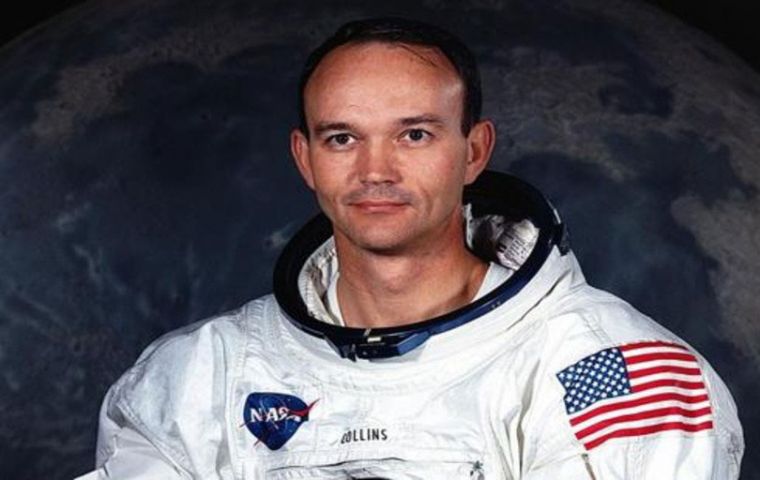MercoPress. South Atlantic News Agency
Apollo 11 astronaut who orbitted the Moon dies at age 90
 Michael Collins was part of the three-man Apollo 11 crew that succeeded at landing on the Moon, on July 20, 1969.
Michael Collins was part of the three-man Apollo 11 crew that succeeded at landing on the Moon, on July 20, 1969. Apollo 11 Mission “odd-man-out” Michael Collins died Wednesday of cancer at the age of 90, his family announced.
When fellow astronauts Neil Armstrong and Edwin “Buzz” Aldrin landed on the Moon aboard lunar vehicle Egle in July 1969, Collins just orbited the Earth's satellite aboard the module Columbia for nearly 28 hours to bring his teammates back home.
“It was a wonderful achievement in the sense that people around the world applauded it - north, south, east, west, rich, poor, communists, whatever,” Collins said in a 2019 interview.
Collins, who in addition to being an astronaut was a test pilot and a major general in the reserve of the United States Air Force, retired from NASA in 1970, just a year after the historic mission. He worked in the State Department and some museums before opening his own consulting firm in 1985.
Along with his companions on the Apollo XI mission, he received the Presidential Medal of Freedom in 1969, and the Congressional Gold Medal in 2011.
Regarding that successful mission, Collins said: “We never talked about the possibility of being stranded on the moon, we didn't even hint at it. I mean we weren't stupid, we knew very well that many things had to go perfectly so that they could leave as they were supposed to,” he added.
Collins was part of the three-man Apollo 11 crew that effectively ended the space race between the United States and the Soviet Union and fulfilled President Kennedy’s challenge to reach the moon by the end of the 1960s.
Though he travelled some 238,000 miles to the moon and came within 69 miles, Collins never set foot on the lunar surface like his crewmates Aldrin and Armstrong, who died in 2012. None of the men flew in space after the Apollo 11 mission.
“It’s human nature to stretch, to go, to see, to understand,” Collins said on the 10th anniversary of the moon landing in 1979. “Exploration is not a choice really — it’s an imperative, and it’s simply a matter of timing as to when the option is exercised.”
“I guess you’re about the only person around that doesn’t have TV coverage of the scene,” Mission Control radioed Collins after the landing. “That’s all right. I don’t mind a bit,” he replied.
After Armstrong and Aldrin finished their tasks on the moon’s surface and lifted off in the lunar lander, Collins was responsible for re-docking the two spacecraft before the men could begin heading back to Earth. Had something gone wrong and Aldrin and Armstrong been stuck on the moon’s surface — a real fear — Collins would have returned to Earth alone.
“I know that I would be a liar or a fool if I said that I have the best of the three Apollo 11 seats, but I can say with truth and equanimity that I am perfectly satisfied with the one I have,” he wrote in his 1974 autobiography.




Top Comments
Disclaimer & comment rulesCommenting for this story is now closed.
If you have a Facebook account, become a fan and comment on our Facebook Page!